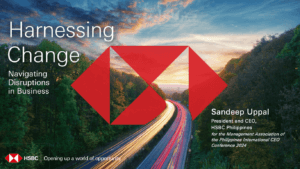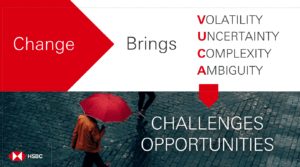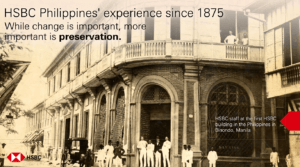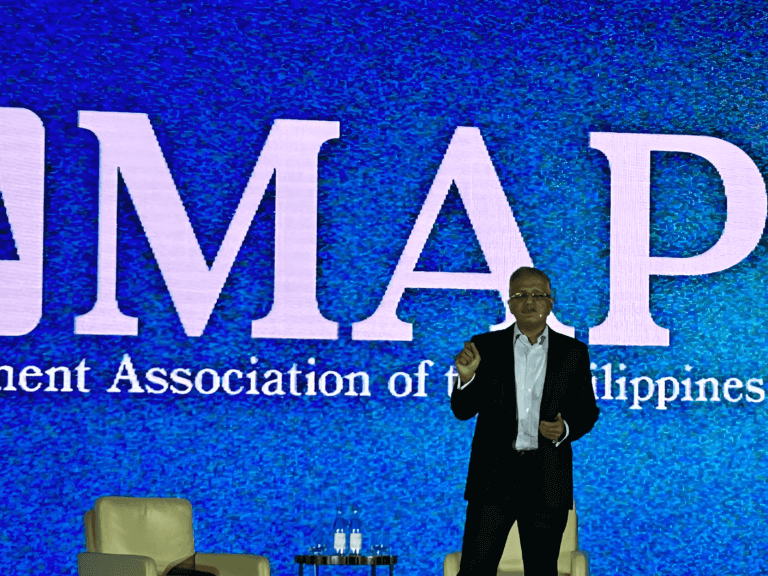On September 10, 2024, at the MAP International CEO Conference, Sandeep Uppal, President and CEO of HSBC Philippines, delivered a compelling session on the challenges and strategies of leading through change in today’s volatile, uncertain, complex, and ambiguous (VUCA) environment. His insights are particularly relevant as organizations across the globe grapple with unprecedented levels of disruption and transformation.

The Nature of Change: A VUCA World
Sandeep framed the current business landscape as a VUCA world, characterized by:
- Volatility: The rapid and unpredictable changes affecting markets and industries.
- Uncertainty: The difficulty in predicting outcomes due to a lack of clear information.
- Complexity: The interconnected nature of global systems that complicates decision-making.
- Ambiguity: The unclear cause-and-effect relationships that make it challenging to understand the impact of decisions.

In such an environment, traditional approaches to change management are often insufficient. He emphasized that leaders must adopt a mindset of continuous adaptation, staying vigilant and responsive to emerging trends and disruptions. Leading through change requires an ability to navigate these complexities with agility and foresight.
The Pillars of Leading Change: Adaptability, Flexibility, and Resilience
He identified three key pillars essential for navigating change successfully:
- Adaptability: This involves a forward-looking mindset where leaders anticipate future trends and make strategic decisions with long-term implications. Adaptability allows organizations to stay ahead of the curve and be proactive rather than reactive.
- Flexibility: Flexibility is about immediate responses to changes. It requires an organization to pivot quickly when faced with unexpected challenges, ensuring that short-term actions align with long-term goals.
- Resilience: Resilience is the capacity to recover quickly from setbacks. Sandeep stressed that resilience is not just about bouncing back but also about learning from failures and using those experiences to strengthen the organization’s ability to handle future disruptions.
The Importance of Psychological Safety
A significant part of Sandeep’s session focused on the role of psychological safety in driving successful change. In environments where change is constant, employees must feel safe to express their ideas, voice concerns, and propose new solutions without fear of retribution. This sense of safety encourages innovation and fosters a culture where change is embraced rather than resisted.
He highlighted that when employees understand the purpose behind change and are given the autonomy to contribute to it, they are more likely to be engaged and motivated. This engagement is crucial for the effective execution of change initiatives and for leading through change effectively.
Aligning Change with Strategy
Sandeep also discussed the importance of aligning change with the organization’s overall strategy. Change for the sake of change can lead to confusion and misalignment, but when it is strategically aligned, it becomes a powerful tool for driving growth and achieving long-term objectives.
He outlined a framework for change that includes clear alignment with strategy, meticulous execution, and a focus on delivering agreed outcomes and value. This structured approach ensures that change initiatives are not only implemented but also yield tangible results that contribute to the organization’s success.

Learning from the Past, Preparing for the Future
While the session emphasized the need to embrace change, he also underscored the importance of preserving what works. He advised leaders to learn from past experiences—both successes and failures—and to strike a balance between driving new initiatives and maintaining the core values and practices that have stood the test of time.
Sandeep’s insights are a powerful reminder that in a world of constant change, the ability to adapt, remain flexible, and build resilience is what will ultimately determine an organization’s success. As businesses continue to navigate the complexities of a VUCA world, these principles will be invaluable in guiding leaders and their teams through the challenges ahead.
Empower Your Leaders to Navigate Change
If you’re looking to equip your leaders with the skills to navigate complex environments and lead through change, visit the John Clements Leadership Institute. We offer tailored programs designed to help your organization thrive in today’s VUCA world. Learn more at John Clements Leadership Institute.





